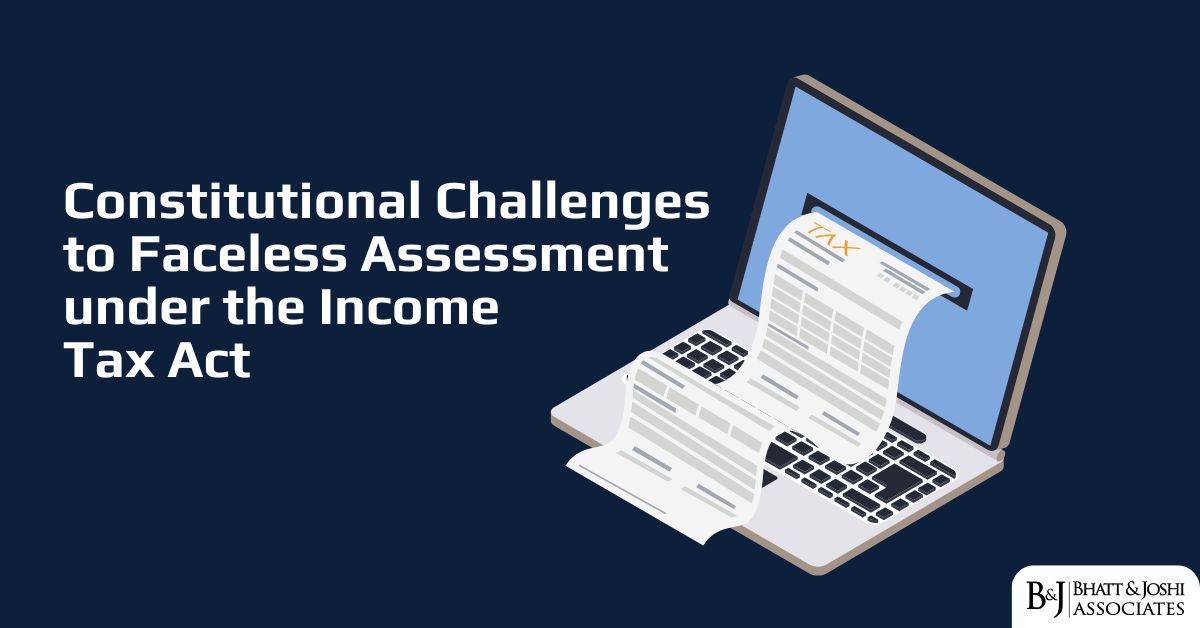Introduction
The introduction of the Faceless Assessment Scheme in India represents one of the most significant structural reforms to the country’s tax administration system in recent decades. Notified initially through Notification No. 60/2020 dated August 13, 2020, and later codified through amendments to the Income Tax Act, 1961, the scheme aims to eliminate human interface between taxpayers and tax authorities, thereby enhancing transparency, efficiency, and accountability in assessment proceedings. However, since its implementation, the scheme has faced numerous constitutional challenges that question its compatibility with established legal principles of natural justice, due process, and the right to fair hearing. This article examines the evolving jurisprudence surrounding faceless assessment under the income tax act, analyzing how courts have responded to constitutional challenges, the legal remedies available to aggrieved taxpayers, and the future trajectory of this digital transformation in tax administration. The analysis delves into the tension between administrative efficiency and taxpayer rights, offering insights into how these competing interests might be reconciled within India’s constitutional framework.
Legal Framework of Faceless Assessment Scheme
The Faceless Assessment scheme finds its statutory foundation in Section 144B of the Income Tax Act, 1961, introduced through the Finance Act, 2021. This provision replaced the earlier Section 143(3A) to 143(3C) and Section 144B introduced by the Taxation and Other Laws (Relaxation and Amendment of Certain Provisions) Act, 2020. The current framework establishes a comprehensive mechanism for conducting assessments without physical interface between the taxpayer and the tax authority.
Section 144B(1) explicitly states:
“The assessment under section 143(3) or under section 144, in the cases referred to in sub-section (2) (other than the cases assigned to the Assessing Officer as may be specified by the Board), shall be made in a faceless manner as per the following procedure, namely:—”
The procedure outlined in the subsequent clauses establishes a multi-tiered structure involving:
- National Faceless Assessment Centre (NFAC): Serves as the primary coordinating body
- Regional Faceless Assessment Centres (RFAC): Conducts assessment proceedings
- Assessment Units: Performs functions such as identifying points for investigation
- Verification Units: Conducts inquiries and verification
- Technical Units: Provides technical assistance
- Review Units: Reviews draft assessment orders
The scheme fundamentally alters the traditional assessment process by disaggregating functions previously performed by a single Assessing Officer and distributing them across specialized units operating through an automated allocation system. This disaggregation, while enhancing specialization and reducing discretion, has raised significant constitutional concerns.
Constitutional Challenges to Faceless Assessment Scheme: Principles at Stake
The constitutional challenges to the Faceless Assessment Scheme primarily revolve around the following principles:
Right to Fair Hearing and Natural Justice
The principle of audi alteram partem (hear the other side) forms a cornerstone of natural justice in India’s legal system. Article 14 of the Constitution, which guarantees equality before law, has been interpreted by the Supreme Court to include the right to a fair hearing in administrative proceedings. In landmark cases such as Maneka Gandhi v. Union of India (1978) 1 SCC 248, the Supreme Court established that administrative actions affecting individual rights must adhere to principles of natural justice.
Under the Faceless Assessment Scheme, the elimination of in-person hearings has raised concerns about whether taxpayers can effectively present their case, particularly in complex matters where written submissions alone may be insufficient. Section 144B(7)(viii) provides for video conferencing, but only “to the extent technologically feasible” and at the discretion of the Chief Commissioner or Director General of Income Tax.
Transparency and Reasoned Decision-Making
Another constitutional concern relates to transparency and the right to reasoned decisions. The Supreme Court in S.N. Mukherjee v. Union of India (1990) 4 SCC 594 held that the right to reasoned decisions is an essential component of administrative justice. Critics argue that the automated nature of faceless assessments, with multiple units involved in different aspects of the assessment process, may compromise the coherence and reasonableness of final assessment orders.
Right to Legal Representation
Article 22(1) of the Constitution recognizes the right to legal representation. While the Faceless Assessment Scheme does not explicitly prohibit legal representation, the practical challenges in effectively utilizing legal counsel in a faceless environment have been questioned. The absence of in-person hearings may limit the effectiveness of legal representation, potentially infringing upon this constitutional right.
Judicial Response to Constitutional Challenges in Faceless Assessment
Delhi High Court’s Approach
The Delhi High Court has been at the forefront of adjudicating constitutional challenges to Faceless Assessment. In Lakshya Budhiraja v. National Faceless Assessment Centre & Anr. [W.P.(C) 4515/2021], the court addressed the issue of natural justice in the context of faceless assessments. The petitioner contended that despite multiple submissions, the assessment order was passed without addressing key contentions, effectively denying the right to be heard.
The court observed:
“The scheme of faceless assessment cannot be used as a shield to pass an assessment order which is in effect and substance, not an assessment order in the eyes of law, being bereft of any application of mind or being passed in violation of principles of natural justice.”
The court set aside the assessment order, directing a fresh assessment with proper consideration of the taxpayer’s submissions.
Similarly, in Veena Devi v. National Faceless Assessment Centre [W.P.(C) 6176/2021], the Delhi High Court emphasized:
“The faceless assessment scheme, while intended to reduce human interface and enhance efficiency, cannot operate to the detriment of taxpayers’ fundamental right to be heard. The scheme must be implemented in a manner that preserves, rather than diminishes, the principles of natural justice.”
Bombay High Court’s Perspective
The Bombay High Court has also contributed significantly to the jurisprudence on Faceless Assessment. In Neelam Jadhav v. National Faceless Assessment Centre (2022), the court addressed procedural irregularities in faceless assessments, particularly focusing on the requirement under Section 144B(1)(xvi) that mandates the NFAC to provide a “draft assessment order” to the taxpayer before finalizing the assessment.
The court held:
“The procedure outlined in Section 144B is not merely directory but mandatory in nature. The failure to follow the prescribed procedure, particularly where it impacts the taxpayer’s right to effectively respond to proposed additions, vitiates the entire assessment.”
In Renaissance Buildtech Pvt. Ltd. v. National Faceless Assessment Centre [Writ Petition No. 3264 of 2021], the Bombay High Court further emphasized the importance of providing reasons when rejecting a taxpayer’s submissions:
“The mere digitization of the assessment process does not exempt tax authorities from their obligation to provide reasoned orders. In fact, the disaggregation of functions under the faceless assessment scheme necessitates greater attention to ensuring that the final order reflects a comprehensive and reasoned consideration of all relevant submissions.”
Supreme Court’s Intervention
While the Supreme Court has not issued a comprehensive ruling on the constitutional validity of the Faceless Assessment Scheme, it has addressed certain aspects in cases like Union of India v. Bharat Forge Co. Ltd. (Civil Appeal No. 984 of 2022). The Court emphasized that administrative efficiency cannot override procedural fairness:
“While technological advancement in tax administration is welcome and necessary, it cannot come at the cost of compromising the fundamental principles of natural justice that have been recognized as part of the basic structure of our constitutional framework.”
Constitutional Issues in Faceless Assessment Implementation
Show Cause Notices and Opportunity to Respond
A recurring issue in constitutional challenges has been the inadequacy of show cause notices issued under the Faceless Assessment Scheme. In Sanjay Aggarwal v. National Faceless Assessment Centre [W.P.(C) 5741/2021], the Delhi High Court observed that show cause notices often failed to provide specific details of proposed additions, making it difficult for taxpayers to respond effectively.
The court noted:
“A show cause notice that merely indicates a proposed addition without specifying the basis or reasoning fails to serve its essential purpose. The taxpayer is entitled to know not just what is proposed but why it is proposed, to enable a meaningful response.”
Section 144B(1)(xvi) requires the issuance of a draft assessment order specifying the details of variations proposed to the income declared by the taxpayer. Courts have consistently held that this provision must be interpreted to require substantive reasoning rather than mere formal compliance.
Denial of Personal Hearings
Another significant constitutional concern relates to the denial of personal hearings. While Section 144B(7)(viii) provides for video conferencing, its implementation has been inconsistent. In Aryan Arcade Pvt. Ltd. v. National Faceless Assessment Centre [W.P.(C) 7178/2021], the Delhi High Court addressed a situation where a request for video conferencing was summarily rejected without providing reasons.
The court held:
“The discretion to grant or deny a video conference hearing must be exercised judiciously and not arbitrarily. The denial of such a request without adequate reasons, particularly in complex cases where written submissions alone may be insufficient, can constitute a violation of the principles of natural justice.”
The court further clarified that while the scheme aims to minimize physical interface, it does not intend to eliminate the taxpayer’s right to be heard effectively. The provision for video conferencing serves as a safeguard for this right and must be implemented in that spirit.
Jurisdictional Issues and Territorial Competence
The centralized nature of the Faceless Assessment Scheme has also raised questions about jurisdictional competence. In Piramal Enterprises Ltd. v. National Faceless Assessment Centre [Writ Petition No. 1542 of 2022], the Bombay High Court addressed concerns regarding the territorial jurisdiction of assessment units and the application of local precedents.
The court observed:
“The virtual nature of faceless assessment does not alter the fundamental principles of territorial jurisdiction established under the Income Tax Act. The assessment, though conducted through a digital platform, must respect the jurisdictional hierarchy and the binding precedents applicable to the taxpayer’s jurisdiction.”
This ruling highlights the tension between the centralized, location-agnostic approach of faceless assessments and the territorial organization of judicial precedents in India’s legal system.
Legislative and Administrative Changes to Faceless Assessment Scheme
In response to judicial interventions and practical challenges, the government has introduced several amendments to the Faceless Assessment Scheme:
- Finance Act, 2022 Amendments: Introduced modifications to Section 144B to address procedural gaps identified by courts, including clearer provisions for handling technical issues during video conferencing.
- CBDT Instruction No. 01/2022 dated 11.01.2022: Provided detailed guidelines on conducting hearings through video conferencing, aiming to standardize the process across assessment units.
- Notification No. 8/2021 dated 27.03.2021: Expanded the scope of cases excluded from faceless assessment, recognizing that certain complex matters may require traditional assessment approaches.
These legislative and administrative responses reflect an evolving understanding of the balance required between digital transformation and constitutional principles.
The Way Forward for Faceless Assessment under the Income Tax Act
The constitutional challenges to Faceless Assessment highlight the need for a balanced approach that embraces technological advancement while preserving fundamental rights. Several potential reforms could help address the current concerns:
Statutory Guarantees of Procedural Fairness
Amendments to Section 144B could explicitly incorporate stronger guarantees of procedural fairness, such as:
- Mandatory video conferencing for assessments involving additions above a specified threshold
- Detailed requirements for show cause notices and draft assessment orders
- Specific timelines for consideration of taxpayer submissions
Enhanced Technological Infrastructure
Improving the technological infrastructure supporting faceless assessments could address many practical challenges:
- Development of more robust video conferencing facilities
- Implementation of advanced document management systems
- Creation of taxpayer-friendly interfaces for submissions and tracking
Specialized Training for Assessment Units
Comprehensive training programs for officers involved in faceless assessments could enhance their ability to balance efficiency with fairness:
- Training on principles of natural justice and constitutional requirements
- Guidance on drafting reasoned orders in a faceless environment
- Development of specialized expertise in evaluating complex submissions
Conclusion
The Faceless Assessment Scheme represents a paradigm shift in India’s tax administration, offering significant potential benefits in terms of efficiency, transparency, and reduced discretion. However, as the evolving jurisprudence demonstrates, these benefits cannot come at the cost of compromising fundamental constitutional principles.
The challenge for both the legislature and the judiciary lies in developing a framework that harnesses the advantages of technology while preserving the essential safeguards of due process and natural justice. The recent judicial pronouncements provide valuable guidance in this direction, emphasizing that digital transformation must complement, rather than replace, the constitutional guarantees that form the foundation of India’s legal system.
As the scheme continues to evolve, a collaborative approach involving input from taxpayers, tax professionals, administrators, and constitutional experts will be essential to ensure that faceless assessment achieves its intended objectives while respecting the constitutional rights of all stakeholders. The path forward lies not in choosing between efficiency and fairness, but in finding innovative ways to enhance both simultaneously through thoughtful design and implementation.














